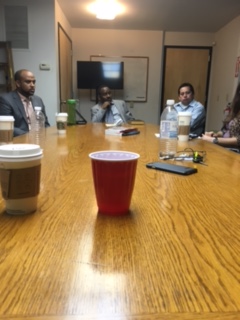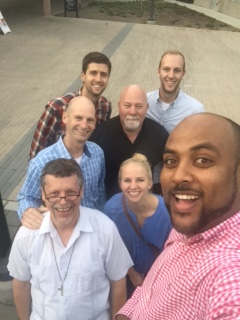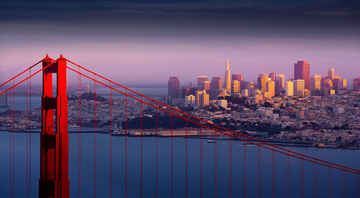|
I had lunch yesterday with Dawit Bokre, a pastor in the San Francisco Bay Area (taking the selfie above). He came as a child from Eritrea in East Africa. By 19 he was leading a group of Eritrean Christians in the U.S. Today, he’s serving with Pastor Aaron Putnam in the San Francisco Bay Area. I visited them last fall because I wanted to see the future.  The San Francisco Bay Area is the least Christian region in the United States (S.F., Oakland, San Jose). I believe that we can look at this city and see the future. Why? Culturally, they are a decade or two ahead of us. What we in the Midwest (or other parts of the country) are experiencing in 2016, they were dealing with in the 1990’s. Cultural centers like New York, Los Angeles, and San Francisco have a trickle-down impact on the nation – politically, socially, financially, technologically, etc. While the “least-churched” region in America, the Bay Area is also:
So what does the future look like? The challenges the church faces in other parts of the country are more pronounced in the Bay Area.
Don’t let the challenges fool you. The future is also incredibly hopeful. Here are three things I learned about the future. Death and Resurrection A nurse log is an old tree that falls. New shoots sprout from it. The old log provides nourishment, and its fall gives an opening of sunlight in the canopy. Everything has a life cycle. If something dies, what new thing will spring forth? Good Shepherd Lutheran is located in Hayward, CA, just south of Oakland. The traditional white congregation is diminished. But from the declining church has emerged Eritrean, Ethiopian, and Hispanic communities. These are the shoots growing out of the log of Good Shepherd’s history and heritage. Pastor Aaron Putnam echoed an old saying, “The church is a series of deaths and resurrections.” So what will rise from the fallen tree? He went on to say, “Go to the Starbucks or DMV. Who do you see? Our church must look like the community we live in.” New sprouts are growing. Good Shepherd looks more like it’s community today than it did 10 years ago. In the future, many of our models and methods will have to die. They served the mission well in a particular era. We need the courage to honorably lead some things to an end. Then we must have the courage to cultivate new growth from the old log. New forms are needed to reach new people. Of course, the substance doesn’t change. It simply springs up in new ways again. Ask, “Does our local congregation look like the local Starbucks or DMV?” If not, how must we position ourselves to connect to the community? Leaders are the Key The focus of the ministries I saw in the Bay Area had little to do with buildings, structure, or programs. Pastor Shiu Ming Lau of the Lutheran Church of the Holy Spirit, a Chinese church in San Francisco said, “We build people.” Discipleship is the focus of the church’s energy and resources. Dawit said, “We always ask, ‘Who’s pouring into you and who are you pouring into?’” This is the long, patient task of discipleship. We apprentice to “masters” ahead of us, and we pour into those behind us. Together, we all follow Christ. In the future, discipleship and leadership development cannot happen haphazardly or accidentally. We used to rely on culture or our institutions (Christian schools, church programs, the predominance of Christian society) to pass on the faith. It just happened. As those things diminish, we must redouble our investment in discipleship. Investing in people must happen intentionally and strategically. Encouraged by the intense focus on relational leadership development, I’m gathering a handful of young men who are new to our church. We're going to meet weekly for discipleship and growth as young leaders. My goal is to one day raise up a leader to takes my job. It doesn't mean I quit, it just means I can do more. Multiply leaders and we multiply gospel impact in our communities. Mission is Risk I was struck by the fact that the ministry leaders I met took risks every day. There was no stability to their paycheck. Many are bi-vocational. There is no stability to their church buildings or the organization of their congregation. Things change so quickly. Despite the challenges, they kept pushing.
It wasn’t that they were reckless. On the frontier you just go, and do, and try new things. You fail quickly and then keep going. It felt like I was walking into the book of Acts. It was a spontaneous movement. They often said, “We’ll see where the Lord leads.” Under-girding this movement was a sincere belief in the divine agency of God. I was convicted by my own tendency toward safety and conservative calculations. In particular, our ethnic brothers and sisters live with great attentiveness to God’s imminent activity. This was evident in their prayers. Their praying was not scripted or performed out of duty. They were earnestly pleading with God. They didn’t just believe in God. They believed God, and expected him to act in mighty ways. Contrasted with a hyper-structured church with strategic plans and organized actions steps, my Bay Area friends trudged through the messy middle of their communities. One of my St. Louis companions, Marcos Kempff, noted “The work of the Holy Spirit often appears to us as chaos and mess.” One of the pastors we visited has a member who works for Facebook. He was kind enough to give us to tour of the Facebook campus. The average age of a FB employee is 28, so I felt elderly. The campus is open, creative, and innovative, all characteristics of the tech industry. As I was considering the adventurous faith of my Bay Area brothers and sisters, I saw a quote on the wall in an open office area. It said: “The only risk is to do nothing.” And so maybe this is my clearest take-away from seeing the future. Our God-given mission is risky. It always has been. The future is no different.
Mimi Rusert
3/17/2016 02:46:02 pm
Well said. If we do not purposefully make each person a disciple, then we fail. No one else is going to lead anyone to Jesus. Then reaching out to our community is key - "our neighbors". The template of the 40's and 40's is long gone. We must be deliberate and intentional to win others for Christ even though it may look messy and chaotic. Just like the first Penecost. Oh to see that. What a joy. Thanks for the perspective Pastor Jeff. Comments are closed.
|
JOIN My Tribe
|




